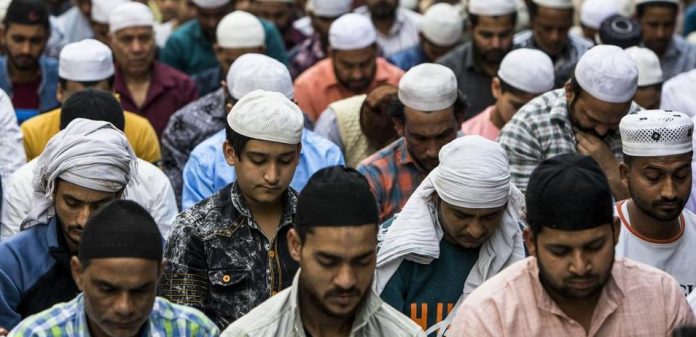– Mohd Naushad Khan
The budget, considered a mirror of government policies, is guided by political compulsion, ideological leanings and aimed at marginalization of minorities for vested political interests.
Ruling parties’ prejudiced approach toward minorities can only be expected to result in a myopic, misjudged and half-hearted budget for minorities. The undermining of equal distribution in social sectors and deprived sections, including Dalits and minorities and absence of welfare-driven budget are an obstacle to the vision of inclusive growth.
According to Jawed Alam Khan, Executive Director of Institute of Policy Studies and Advocacy, New Delhi, “The combined share of minorities (18.22%), SCs (16.75) and OBCs (48%) in the NCT of Delhi, i.e. 83 percent, comprises a huge population of weaker sections in the state. Unfortunately, this vast majority of Delhi does not have direct access to the fiscal provisions in a significant way, as budgets of the state reveal year after year. Though the budget for SCs/STs/OBCs/minorities has increased amount-wise during the present government to some extent, the percentage of direct share of weaker sections is almost
static: less than 0.60% of total budget in the current financial year, which has reduced since 2015.”
“It was 0.98% during 2013-14 budget of the previous government. Weaker sections, particularly Muslims, remain adversely affected due to this inadequate fiscal support. The only scheme for weaker sections of Delhi that finds increasing espousal from the Government of NCT of Delhi is the Tuition Fee Reimbursement to the Students of Private Schools, which is meant for EWS category of children under RTI Act. The budget allocation for SCs/STs/OBCs/Minorities through the nodal department in such schemes as Scheme for Purchase of Stationery, Scheme for Merit Scholarship for School Children, etc. is constantly decreasing,” added Alam.
“Moreover, the Scheme for Vocational and Technical Scholarships has shown unsteadiness during the past few years. There is increase in the amount of grants from the Ministry of Minority Affairs under MSDP/PMJVK for Delhi. It may be either due to inadequate projects on the part of GNCTD or an inadequate amount approved by MoMA. The budget allocation by the Revenue Department was earmarked Rs.107.70 crore and it has declined to Rs.52.09 crore in 2024-25. However, actual allocation for 2022-23 was Rs.29.04 crore,” said Alam.
In Uttar Pradesh, after the presentation of Budget, Samajwadi Party chief Akhilesh Yadav asked the government what is there in it for 90 percent of people who are Picchde, Dalit and Alpsankhyak (PDA).
“Whether the budget of UP is Rs.7 lakh crore or Rs.8 lakh crore… the question remains what is there in it for 90 percent of people, meaning the PDA,” Yadav said in his post on X.
Taking a dig at the Yogi Adityanath government, Yadav said, “Actually, the BJP’s policy is anti-common people, it keeps 90 percent of budget for 10 percent of rich people and only a nominal 10 percent of budget for 90 percent of needy people.”
At a time when there is demand for inclusive approach, the focus of UP’s ₹7.36-lakh-crore budget was for Lord Ram. In his 70-minute speech, Finance Minister Suresh Khanna frequently referred to Lord Ram and began with a line from the Ramcharitmanas. According to Chief Minister Adityanath, the budget is intended for “Lok Mangal,” or public welfare, and has been dedicated to Lord Ram.
In Bihar, Samrat Chaudhary, Finance Minister, while presenting budget for 2024-25, mentioned many departments and schemes of those departments. But he did not consider it necessary to mention the Minority Welfare Department.
Recently caste-based census was done in Bihar. According to it, the population of Muslims in accordance to 17.7 percent is 23149925. But the total budget of Minority Welfare Department for the next financial year has been fixed at only Rs.648 crore. Out of this, only Rs.588 crore has been earmarked for development scheme. In 2023-24, total budget of this Department was Rs.636 crore, out of which only Rs.583 crore was for development scheme.
Compared to last year, there is an increase of only Rs.5 crore in Development Scheme item of the Minority Welfare Department. However, the total budget of the Department in 2022-23 was Rs.570 crore while Rs.523 crore was earmarked for Development Scheme.
“The Assam government’s finance minister Smt. Ajanta Neog presented a budget of Rs.2.9 lakh crore on 12 February 2024 for 2024-25. However, Welfare of Minorities and Development department has been allocated a meager amount of Rs.91.67 Crore, said Khurshed Khan on Budget for Minorities in Assam.
“Assam ranks among bottom-three States in SDG India Development Index 2020–21 released by NITI Aayog. Only Bihar and Jharkhand performed worse than Assam. Minorities are around 40% of the state population and are lagging behind in development. But the recent budget lacks focus on economic upliftment and infrastructure development for minority communities. There is no special scheme announced in the budget for empowering various minority communities,” said Khurshed.




